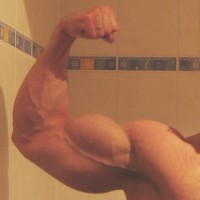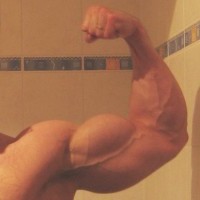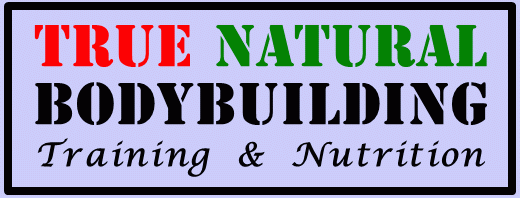Nutrition
Nutrition is extremely important in bodybuilding, but fortunately it is also very simple. Basically a good bodybuilding diet equals a normal healthy diet plus three big protein shakes per day. Can it be any simpler? For those of you who didn't learn at school how a normal healthy diet looks like, I recommend you to do some research on the internet. I also advise you to take a look at my section on losing body fat.
Calories
The total number or calories that you daily eat and drink is very important. If you take in more calories than your body burns, you will gain weight. If you take in fewer calories than your body burns, you will lose weight. The number of calories that you burn during a typical day (= daily caloric need) depends on your gender, age, body weight, lean body mass, length and physical activity. You can try out my calculator to estimate your daily caloric need or a more advanced formula on the internet. If you want to build muscle mass, your calorie intake should be equal to or a few hundred calories higher than your daily caloric need. If you want to lose body fat your calorie intake should be a few hundred calories lower than your daily caloric need.
I personally eat about 3500 calories per day when I train 5 days per week. Bodybuilders who use anabolic steroids usually consume much more calories, even up to twice as many calories. The really big enhanced bodybuilders often eat between 6000 and 8000 calories per day without gaining any body fat.
Note: one gram of carbohydrates, proteins, fat, and alcohol contain 4, 4, 9, and 7 calories, respectively. One kilogram (2.205 lbs) of body fat contains about 7700 calories.
Healthy Diet
If you want to learn some general things about a healthy diet, please search the internet. Below I provide some of my personal opinions on the main nutrients, and I say something about their relevance in a bodybuilding diet.
Water
Water is the most important nutrient for almost any living organism. Drinking a lot is healthy, especially for the kidneys. Drink about 3 liters of water per day (milk and juice contain about 90% water). Don't drink too much alcohol, caffeine and sugar containing drinks. Unless your workouts take longer than 1 hour, there is no real need to drink or eat during your workouts.
Protein
Protein is without any doubt the most important nutrient for any bodybuilder. Eat at least 1 gram of animal protein for each pound of your body weight (1 kg = 2.205 lbs). I personally eat about 300 grams of protein per day. A high daily intake of protein is an absolute requirement to make muscle growth possible, and protein is excellent in reducing the hunger feeling during a low calorie diet. Good sources of protein are milk, eggs, poultry, meat and fish.
Carbohydrates
Carbohydrates (carbs) are the best source of energy for bodybuilders as they are easily converted into glycogen, the main form of stored energy in the muscles. Don't eat too much fructose (fruit sugar) containing carbs such as sucrose (table sugar) and HFCS (high-fructose corn syrup) as they more easily get converted into fat, and opt for carbs with a low to medium glycemic index whenever possible to ensure a gradual release of glucose into the bloodstream. Good sources of carbs are vegetables, fresh fruit, milk, pasta, rice, bread, crisp bread, potatoes, and cereals such as oats, wheat, corn and barley.
Fat
Keep your fat intake limited. Avoid saturated fats, which are usually from animal origin. Good sources of fat are fat fish, nuts, seeds, and vegetable oils such as flaxseed oil (rich in omega-3 fatty acids that may reduce the risk of coronary heart disease), olive oil (rich in monounsaturated fatty acids that may reduce the risk of coronary heart disease), sunflower oil (rich in vitamin E which is a strong antioxidant that prevents the cell-damaging effects of free radicals) or coconut oil (composed mainly of medium-chain triglycerides, which may not carry the same health risks as other saturated fats).
Creatine
Creatine naturally occurs in the muscles where it plays an important role in the energy supply during exercise. While your body is able to make creatine itself, also your diet is an important source of creatine for your body. Approximately half of creatine stored in the muscles originates from food. Creatine is a natural nutrient mainly present in poultry, meat and fish at about 3 to 7 g per kg. As a bodybuilder, you need to eat 3 to 5 grams of creatine per day for optimal performance. Since most of us don't eat big amounts of poultry, meat and fish, and since part of the creatine is broken down by heat during the cooking process, supplementation of creatine may be worth considering.
(use the 5% discount code MP51244 during checkout)
Here I buy supplements myself. - Jos -
Vitamins and minerals
Vitamins and minerals are essential nutrients for a good health. However, if you follow a normal healthy diet, especially if you regularly include some grains, nuts, fresh fruit and vegetables, you will have plenty of all vitamins and minerals. Extra vitamins or minerals will certainly not stimulate muscle growth or body fat reduction.
Nicotine, alcohol, caffeine and other addictive drugs
I don't believe it is possible to be a successful true natural bodybuilder if you are addicted to any of these drugs, especially nicotine (tobacco).
Protein Shakes
Protein shakes are the simplest, least expensive, and most effective way to turn your normal healthy diet into an effective bodybuilding diet. I recommend you to drink three big protein shakes per day in between your other meals. Blend about 60 grams of milk protein powder (= about 50 grams of pure protein) with 0.5 liter of non-fat milk. Each protein shake will then contain about 66 grams of high quality protein, 25 grams of lactose (which is a very good carbohydrate with a low glycemic index), a few grams of fat, and a total of about 375 calories. Adjust the size of your shakes to your personal needs.
For those who are lactose intolerant I recommend to use egg protein powder and soy milk, juice or plain water to prepare your protein shakes. There also exist protein powders that are very low in lactose, very interesting for lactose intolerant people who have difficulties digesting lactose (milk sugar).
When I was still studying at the university and didn't have access to protein powder, I used to drink a gallon (3.8 liters) of non-fat milk per day, eat three eggs per day, and lots of turkey, chicken breasts and tuna instead of protein shakes. In the mean time I have tried many brands and kinds of protein powder, and I find all of them equally effective.
Meal Replacement Shake
Let me also present how I make my favorite whole meal shakes that are rich in high quality proteins and carbohydrates, high in fiber, low in fat, full of all necessary vitamins and minerals, and free of chemical additives. Add the following ingredients into your blender:
- 1 banana
- 500 mL of (skimmed) milk
- 250 mL of fruit juice (orange, apple, pineapple or grape)
- 60 grams of milk protein powder (100% natural and free of chemicals)
- 35 grams of done whole grain wheat flour (Brinta Classic) or fine milled oats
After blending for 30 seconds you get a delicious shake of 700 calories containing 100 gram carbs, 70 gram protein, a few grams of fat, and 750 mL water. Note that orange juice, apple juice, pineapple juice and grape juice contain 47, 46, 53 and 60 calories per 100 g, respectively. Orange juice contains by far the most vitamin B and C.
If you want an extra thick shake that digests more slowly and kills the hunger for a longer time, you can add a small amount (<1 g) of xanthan gum or guar gum. It is also possible to add extra flavor by means of commercially available calorie free flavoring drops.
Post-Workout Shake
The main energy source for a bodybuilding workout is glycogen. A total of about 500 gram of glycogen is normally stored in your muscles and another 100 gram in your liver. During an intense bodybuilding workout your body consumes about 100 gram of glycogen, depending on the duration and intensity of your workout. Also some muscle proteins are broken down during your workout and their amino acids (mainly the BCAA's) are used as fuel.
Scientific studies have demonstrated that during the first 2 hours after a workout your body is able to recover its lost glycogen and muscle protein very fast and efficiently if the necessary nutrients are available in the blood. Although there is no substantial evidence that a fast post-workout recovery results in increased long term muscle gain, it has become popular among bodybuilders to consume a fast digesting nutrient-rich meal shortly after each workout.
As a simple and healthy replacement for the commercially available post-workout supplements, you can drink 300 mL of grape juice shortly after your workout, followed by a whey protein shake (50 g whey, 300 mL orange juice, 300 mL skimmed milk) 10 minutes later. This releases a total of about 90 gram of carbohydrates and 50 gram of amino acids into your bloodstream during the next 2 to 3 hours. The glucose and the fructose from the fruit juices serve the glycogen synthesis in the muscles and liver, respectively. The amino acids from the whey protein serve the recovery of the muscle proteins.
Bodybuilding Diet Plan
Also take a look at my concrete example of a good bodybuilding diet plan and the TNBB diet plan excel spreadsheet which you can use to build your own diet plan.


